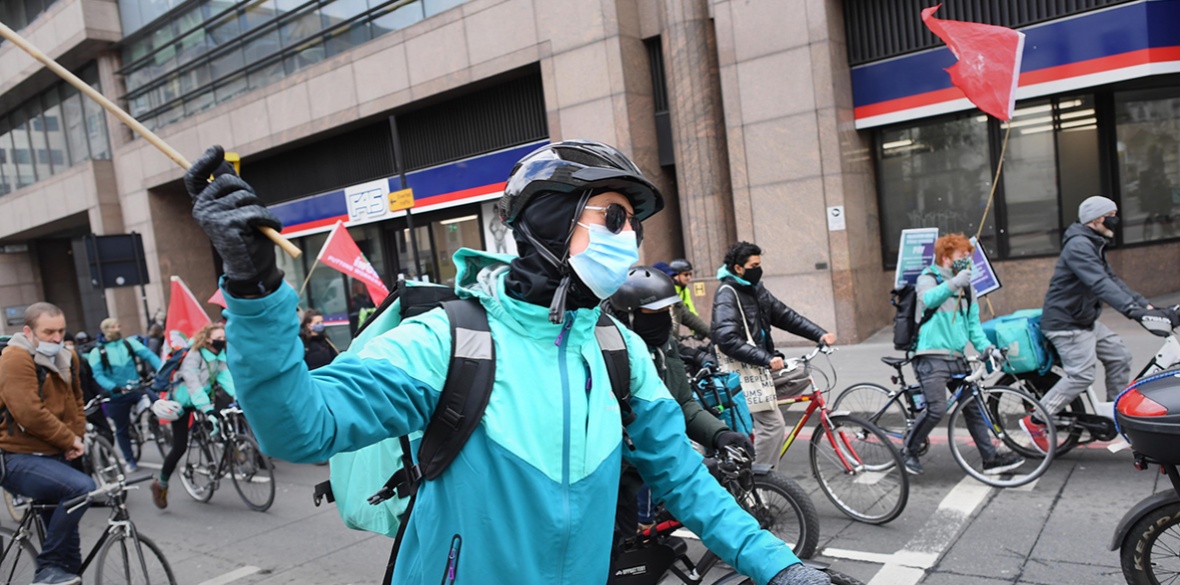This is the last article you can read this month
You can read more article this month
You can read more articles this month
Sorry your limit is up for this month
Reset on:
Please help support the Morning Star by subscribing here
INSECURE and gig-economy workers are twice as likely to die from Covid-19 as those in more secure work, damning analysis by the TUC has revealed.
Lack of sick pay, fewer rights and endemic low wages, combined with occupations that frequently expose people to the virus, have contributed to a mortality rate among insecure workers double that among others, according to the trade union body.
Among male workers without guaranteed regular hours or income, or in low-paid self-employment, the Covid-19 death rate between March and December last year was 51 per 100,000, compared with 24 per 100,000 for those in more secure work.
Women in similarly insecure work faced a mortality rate of 25 per 100,000, compared with 13 per 100,000 for those with less job insecurity.
The stark figures, drawn from official data, were underlined yesterday by a separate TUC poll revealing that, at a shocking 67 per cent, insecure workers are almost 10 times more likely than others to receive no sick pay at all.
Calling for the pandemic to become a turning point, the TUC said that sick pay must be raised to the level of the real Living Wage and available to all workers, and zero-hours contracts and false self-employment banned.
It pointed out that one worker in nine is in insecure work, and that women, disabled workers and black and minority ethnic (BME) workers are far more likely to be in precarious work — almost half of workers on zero-hours contracts are from ethnic minorities.
Those in insecure occupations have largely continued to work outside the home during the pandemic, many being key workers whose undervalued role has been thrown into relief by the crisis.
Britain has one of the lowest rates of state sick pay in Europe and nearly two million workers do not earn enough to qualify for it.
This undermines the prospect of a safe return to work and forces many to choose between doing the right thing and putting food on the table, the TUC said.
TUC general secretary Frances O’Grady said: “No matter your race or background, everyone deserves fair pay and to be treated with dignity and respect. But during the pandemic, we’ve seen higher infections and death rates in insecure jobs.
“Too many workers are trapped on zero-hours contracts or in other sorts of insecure work, and are hit by a triple whammy of endemic low pay, few workplace rights and low or no sick pay.
“Lots of them are the key workers we all applauded – like social care workers, delivery drivers and coronavirus testing staff.
“This must be a turning point. Ministers must urgently raise statutory sick-pay to the level of the real Living Wage, and make sure everyone can get it — including those on zero-hours contracts and other forms of insecure work.”
But it was also time to “tackle the scourge of insecure work,” Ms O’Grady said, adding: “It’s time to ban zero-hours contracts, false self-employment and to end exploitation at work.”
Unite health and safety adviser Rob Miguel said: “This latest evidence once again demonstrates that when it comes to Covid-19 we are not all in this together.
“It’s a national scandal our workers have to face going into work sick or cannot self-isolate, simply to put food on the table.
“Not only is this inhumane, it has certainly led to increased infections and added to the insidiously high death toll.”
Katie Schmuecker of the Joseph Rowntree Foundation said: “The risks of the pandemic have not been borne equally, with women, disabled and BME workers the most likely to be in precarious work.”
The foundation’s research has shown that people on zero-hours or temporary contracts were four times more likely to lose their job during the first lockdown, while self-employed people were three times more likely to stop working than permanent workers.
And the lowest-paid and part-timers were twice as likely to lose their jobs than the highest-paid.











